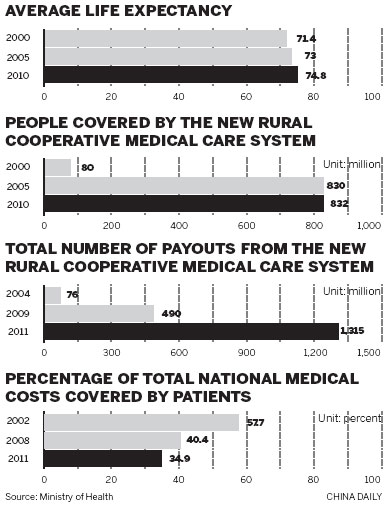Govt vows to upgrade hospital services
Updated: 2012-09-18 08:07
By Shan Juan (China Daily)
|
||||||||

Improving public medical units long considered toughest task
China will firmly push forward reform programs at public hospitals, which currently supply more than 90 percent of the nation's medical care, Minister of Health Chen Zhu said at a news conference on Monday.
Chen said public hospitals will see moderate development as more room will be made for growth of private investments in the sector. China currently has more than 13,000 public hospitals.
To date, reform programs have been launched in more than 2,000 public hospitals, mainly at the county level, and "we'll expand that into more than 300 additional counties within the year", he said.
"In coming years, the priority of public hospitals should be shifted to the improvement of medical treatment and service quality while providing basic medical care for the people," he said.
Under the medical reforms launched by the central government in 2009, public hospital reform has long been considered the toughest task, experts said.
For a long time, public hospitals have been harshly criticized for their random prescriptions, high prices and inadequate medical resources. Doctors were wrongly encouraged to prescribe expensive or unnecessary drugs to patients, from which hospitals usually sought profits.
"Treating a common cold could easily cost me several hundred yuan," said Huo Jian, an office clerk in Beijing.
Despite that, key public hospitals were usually crowded as veteran doctors have always been scarce, she complained, adding that she used to pay an extra 500 yuan ($79) to see a specialist.
To address these problems, a series of measures have been introduced: improving service quality and efficiency; controlling medical costs; adjusting the pricing mechanism; and most important, weaning hospitals from their reliance on drug sales, said Wu Ming, assistant director of the Peking University Health Science Center.
"As the reform deepens, it will be extremely hard to bring the reforms to large public hospitals at cities given that the reforms include other government departments such as the Assets Supervision and Administration Commission of the State Council, and the Ministry of Human Resources and Social Security," she said.
Also, the government's approach to managing public hospitals should be fine-tuned to facilitate the reform, she said.
"Currently, authorities intervene too much in public-hospital operations such as employment," Wu said.
She suggested introducing a check-and-balance system comprising a council of trustees, the hospital president, and a board of supervisors, which has been piloted at Beijing's Chaoyang Hospital and Friendship Hospital, both of which are public.
In each case, the council appointed by the capital's hospital management bureau has the say in the hiring of hospital presidents.
"Thereafter, the president not only represents the hospital but also the government. Enforcing government policies tops the president's work agenda," she said.
shanjuan@chinadaily.com.cn
(China Daily 09/18/2012 page5)

 Relief reaches isolated village
Relief reaches isolated village
 Rainfall poses new threats to quake-hit region
Rainfall poses new threats to quake-hit region
 Funerals begin for Boston bombing victims
Funerals begin for Boston bombing victims
 Quake takeaway from China's Air Force
Quake takeaway from China's Air Force
 Obama celebrates young inventors at science fair
Obama celebrates young inventors at science fair
 Earth Day marked around the world
Earth Day marked around the world
 Volunteer team helping students find sense of normalcy
Volunteer team helping students find sense of normalcy
 Ethnic groups quick to join rescue efforts
Ethnic groups quick to join rescue efforts
Most Viewed
Editor's Picks

|

|

|

|

|

|
Today's Top News
Health new priority for quake zone
Xi meets US top military officer
Japan's boats driven out of Diaoyu
China mulls online shopping legislation
Bird flu death toll rises to 22
Putin appoints new ambassador to China
Japanese ships blocked from Diaoyu Islands
Inspired by Guan, more Chinese pick up golf
US Weekly

|

|







